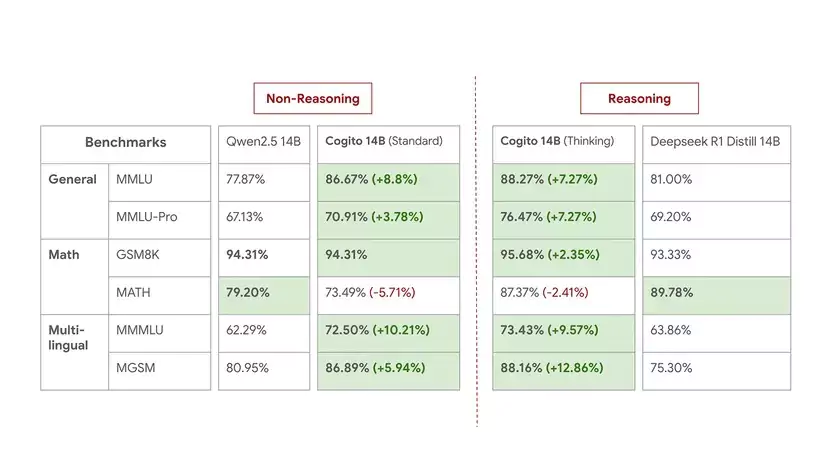April 9, 2025 – Deep Cogito, a San Francisco-based AI startup, has burst onto the scene with the release of its first open-source large language models (LLMs), Cogito v1, on April 8, 2025. The models, which range from 3B to 70B parameters, are already topping benchmark charts, outperforming Meta’s Llama models and introducing a novel training methodology called Iterated Distillation and Amplification (IDA) that could redefine AI development.
The Cogito v1 models excel across various benchmarks, with the Cogito 3B scoring 72.6% on MMLU in reasoning mode, surpassing Llama 3.2 3B by 13.9 points, and the Cogito 70B achieving 91.0% on MMLU, outperforming Llama 4 Scout 109B, as reported in a VentureBeat article on the release. The models also support native tool-calling, with Cogito 3B scoring 92.8% on simple tool calls, a capability absent in Llama 3.2 3B, per a SiliconANGLE report on the models’ performance.
Deep Cogito’s IDA methodology is at the heart of its success, enabling models to self-reflect and improve iteratively, as explained in an Artificial Intelligence News article on the approach. “When we study superintelligent systems, we find two key ingredients: Advanced Reasoning and Iterative Self-Improvement,” the company noted, citing successes like AlphaGo. Developed by a small team in just 75 days, the models were built on Llama and Qwen checkpoints, optimized for coding and agentic use cases, per a TechCrunch report on Deep Cogito’s emergence.
 Founded by Drishan Arora and Dhruv Malhotra, Deep Cogito is committed to open-source AI, with plans to release larger models up to 671B parameters, as noted in the VentureBeat article. The company’s partnerships with Hugging Face, Together AI, and others have made the models widely accessible, per the TechCrunch report. However, there are trade-offs: while Cogito 70B excels in reasoning, it trails DeepSeek R1 in mathematical tasks, scoring 83.3% on MATH compared to DeepSeek’s 89.0%, as highlighted in the SiliconANGLE report.
Founded by Drishan Arora and Dhruv Malhotra, Deep Cogito is committed to open-source AI, with plans to release larger models up to 671B parameters, as noted in the VentureBeat article. The company’s partnerships with Hugging Face, Together AI, and others have made the models widely accessible, per the TechCrunch report. However, there are trade-offs: while Cogito 70B excels in reasoning, it trails DeepSeek R1 in mathematical tasks, scoring 83.3% on MATH compared to DeepSeek’s 89.0%, as highlighted in the SiliconANGLE report.
Experts are taking notice. “Deep Cogito’s hybrid reasoning approach could set a new standard for open-source AI,” said AI ethicist Timnit Gebru in a Wired article on the launch. In San Francisco, where 65% of tech professionals follow AI news (2024 Gartner survey), the release has generated buzz, aligning with trends like Meta’s Llama 4 launch and Microsoft Copilot’s updates. As Deep Cogito scales, its IDA methodology may reshape AI development, offering a glimpse into the future of superintelligence. For more on AI innovation, explore our coverage of AI-driven conservation efforts.







